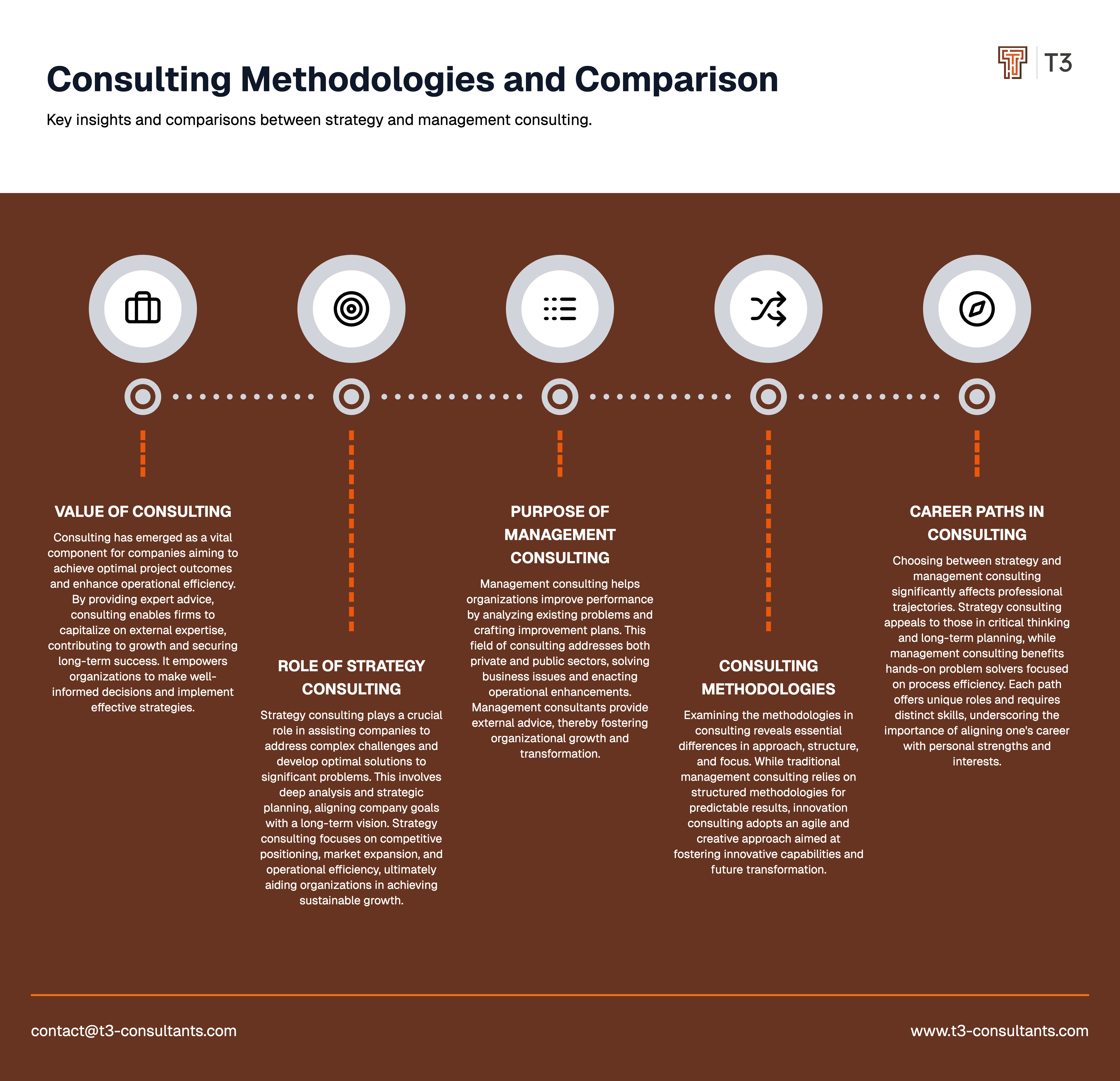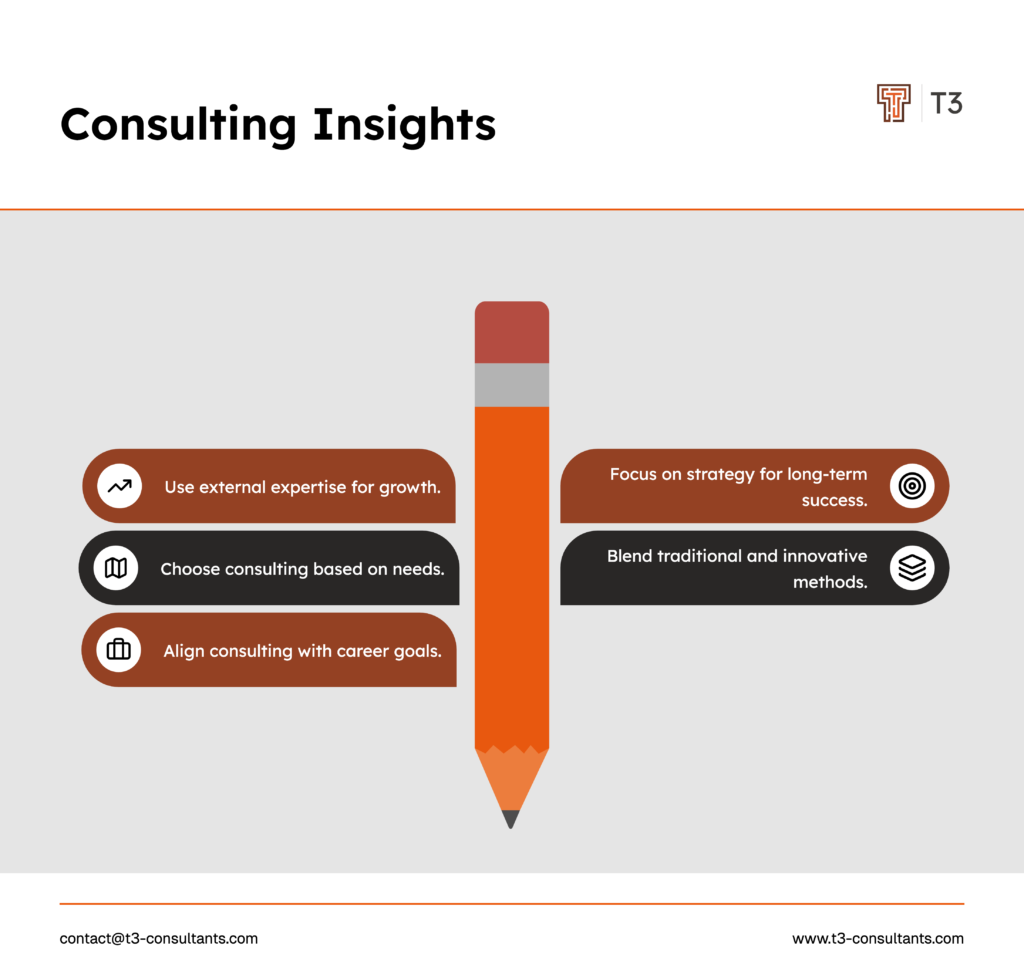
Strategy vs Management Consulting: Key Differences
Introduction
Consulting has become an indispensable component for companies looking to optimize project outcomes and increase operational efficiency. It consists of expert advice provided to companies to help make well-informed decisions and implement effective strategies. Consulting holds great value as it allows firms to capitalize on external expertise, driving growth and securing long-term success.
In the field of consulting, two main types are prevalent – strategy consulting and management consulting. Both are crucial in aiding companies to reach their objectives, though they operate differently and focus on separate aspects of a company’s operations. Strategy consulting involves long-term planning and competitive positioning, while management consulting focuses on improving internal processes and operations. By comparing the two, companies can determine which best suits their needs, helping them choose the right approach to promote efficiency and innovation in their projects. Distinguishing between these two domains is essential for companies looking to excel in today’s competitive landscape.
What is Strategy Consulting?
Strategy consulting is a branch of management consulting that plays a key role in helping companies tackle complex challenges and find optimal solutions to critical problems. This service requires deep analysis and strategic planning to align a company’s goals with its long-term vision. Strategy consultants from top firms analyze scenarios, provide solutions, and help companies grow sustainably.
Strategy consulting primarily advises business executives and leaders in making smart decisions to enhance the organization’s performance. The consultation process starts with a complete evaluation of the client’s current operational and market scenario, considering their competitor positioning and other parameters. Consultants gather data internally and externally, conduct interviews, and identify areas needing strategic intervention.
The scope of strategy consulting centers around market expansion, market entry strategies, operational efficiency, and process optimization for reducing cost and enhancing productivity. Strategy consultants also focus on product development, helping clients adapt their services to changing consumer needs and embrace new technologies.
The results of strategic consulting are typically transformative for a business. Organizations can expect benefits such as higher revenues, lower costs, and an enhanced corporate image. This service may also bring additional advantages, like changes in corporate culture and a move towards a more agile workplace.
Top executives engage in strategy consulting to achieve a competitive edge in the market and ensure their strategic plans position them ahead of peers. With the best strategy consulting services, companies can confidently navigate the changing business environment, achieve sustainable growth, and realize long-term success.
Definition of Management Consulting
Management consulting involves helping organizations improve performance by analyzing existing problems and developing improvement plans. Organizations may use management consultants for external advice and specialized expertise.
The industry grew notably in the 1950s and 1960s, with firms such as McKinsey & Company, founded in 1926. The evolving recognition of economic results led to the global expansion of consulting firms.
Overview
Management consulting helps organizations by solving problems and finding new, improved ways of operating. It spans both private and public sectors to reduce costs and enhance services.
Consultants take a structured approach to understanding and solving business challenges. These may include analyzing industry structures, identifying business needs, strategic and financial planning, and improving operations.
Management consultants typically work with senior leaders, providing objective advice to solve challenges and transform business operations. They offer professional expertise for organizational growth but do not implement business operations, requiring client self-determination.
Management consulting covers six main areas:
- Strategic Management
- Operations Management or Production Management
- Information Technology Consulting
- Human Resources Consulting
- Marketing Consulting
- Financial Consulting

Role
The main role of a consultant is to help define or solve problems by providing information, analyses, and plans necessary for business procedures. The aim is to enhance operations without necessarily having specific expertise but through experience, industry access, and skilled recommendations.
Comparison: Key Differences in Consulting Methodologies
Understanding the differences between consulting methodologies is crucial for firms seeking professional help. Whether for improving efficiency, refining planning, or innovating services, the consulting approach substantially impacts outcomes.
Methodology Variances in Consulting
Consulting methodologies vary greatly in approach, structure, and focus. Traditional management consulting uses a structured methodology, emphasizing data, benchmarking, and problem-solving to generate actionable strategies.
Conversely, innovation consulting methodologies are agile and adaptable, applying creative principles like design thinking to foster innovative capabilities and solutions for growth and competitive advantage.
Results of Different Consulting Approaches
Different methodologies deliver varying results. Traditional management consulting yields predictable, quantifiable results with clear recommendations. Innovation consulting, however, offers more qualitative outcomes aimed at future transformation, making immediate measurement challenging.
Similarities Between Consulting Methodologies
Despite their differences, consulting methodologies share common ground in solving business problems and aiding strategic goal pursuit, relying on analytical tools and industry insight.
Many consulting firms blend elements of both traditional and innovative practices to offer bespoke solutions, ensuring creative results are underpinned by analytical rigor.
Conclusion
In summary, although methodologies and outcomes differ in consulting, many firms benefit from a combined approach. Understanding these differences allows a firm to choose a consulting approach tailored to its needs, facilitating tangible changes. Whether improving operational effectiveness or promoting innovation, selecting the right consulting path significantly boosts a firm’s success prospects.
Strategy vs. Management Consulting
Choosing between strategy and management consulting greatly influences one’s professional trajectory. Understanding their distinctions ensures alignment between skills, career goals, and consulting opportunities.
Strategy Consulting: Works with top-level executives to solve major directional issues, focusing on growth, competition, and strategic market entry. It’s ideal for those who enjoy critical thinking and long-term planning, potentially leading to roles like Chief Strategy Officer.
Management Consulting: Concentrates on organizational efficiency, solving problems through a business lens, focusing on process efficiency, cost-cutting, and change management. It’s suited for hands-on problem solvers and offers positions like Operations Manager.
To choose the best fit, reflect on your skill set and interests. Strategy consulting centers on analytical reasoning, while management consulting values operational ability and teamwork.
Furthermore, investigate the companies you target, as some specialize while others have separate strategy and management arms. Global firms may offer both, but boutique firms might focus on one area. Understanding career opportunities and progression in each stream helps make informed decisions, leading to successful consultancy careers.
Successful consulting depends on structured strategy and execution, enabling organizations to address complex obstacles confidently. This insight emphasizes strategic thinking and execution, serving as a guide for delivering sustainable results and enhancing decision-making.
Better strategy means better outcomes.
